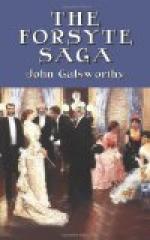Soames rose.
“Are you a partner?”
“Not for six months, yet.”
“The rest of the firm had better make haste and retire.”
Mont laughed.
“You’ll see,” he said. “There’s going to be a big change. The possessive principle has got its shutters up.”
“What?” said Soames.
“The house is to let! Good-bye, sir; I’m off now.”
Soames watched his daughter give her hand, saw her wince at the squeeze it received, and distinctly heard the young man’s sigh as he passed out. Then she came from the window, trailing her finger along the mahogany edge of the billiard-table. Watching her, Soames knew that she was going to ask him something. Her finger felt round the last pocket, and she looked up.
“Have you done anything to stop Jon writing to me, Father?”
Soames shook his head.
“You haven’t seen, then?” he said. “His father died just a week ago to-day.”
“Oh!”
In her startled, frowning face he saw the instant struggle to apprehend what this would mean.
“Poor Jon! Why didn’t you tell me, Father?”
“I never know!” said Soames slowly; “you don’t confide in me.”
“I would, if you’d help me, dear.”
“Perhaps I shall.”
Fleur clasped her hands. “Oh! darling—when one wants a thing fearfully, one doesn’t think of other people. Don’t be angry with me.”
Soames put out his hand, as if pushing away an aspersion.
“I’m cogitating,” he said. What on earth had made him use a word like that! “Has young Mont been bothering you again?”
Fleur smiled. “Oh! Michael! He’s always bothering; but he’s such a good sort—I don’t mind him.”
“Well,” said Soames, “I’m tired; I shall go and have a nap before dinner.”
He went up to his picture-gallery, lay down on the couch there, and closed his eyes. A terrible responsibility this girl of his—whose mother was—ah! what was she? A terrible responsibility! Help her—how could he help her? He could not alter the fact that he was her father. Or that Irene—! What was it young Mont had said—some nonsense about the possessive instinct—shutters up—To let? Silly!
The sultry air, charged with a scent of meadow-sweet, of river and roses, closed on his senses, drowsing them.
V
THE FIXED IDEA
“The fixed idea,” which has outrun more constables than any other form of human disorder, has never more speed and stamina than when it takes the avid guise of love. To hedges and ditches, and doors, to humans without ideas fixed or otherwise, to perambulators and the contents sucking their fixed ideas, even to the other sufferers from this fast malady—the fixed idea of love pays no attention. It runs with eyes turned inward to its own light, oblivious of all other stars. Those with the fixed ideas




